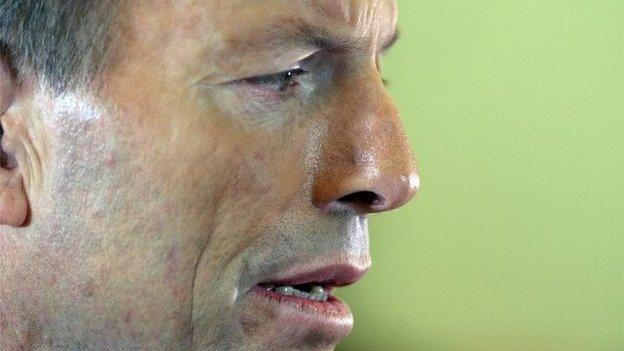Tony Abbott's stumbling blocks with Australian voters
- Published
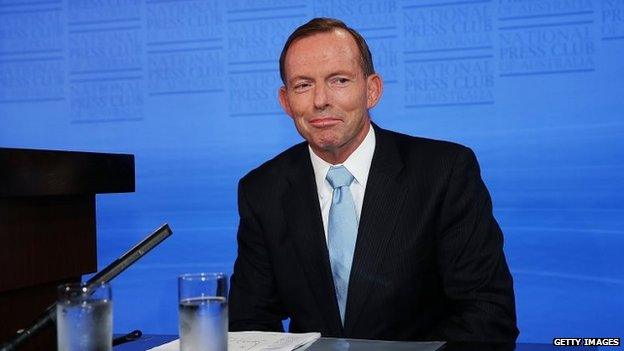
Why is Mr Abbott vulnerable - and what has raised voters' hackles?
Two Liberal party MPs say they will move a leadership challenge against Australian Prime Minister Tony Abbott, as his popularity slumps.
Mr Abbott threw Kevin Rudd from power in the September 2013 general election, condemning Labor's infighting and declaring that Australia was "under new management".
But almost 18 months in, the Liberal leader's approval rating stands below 30%. Two key deputies, Foreign Minister Julie Bishop and Communications Minister Malcolm Turnbull, are both being asked whether they have leadership ambitions.
So how did Mr Abbott get here? What were the issues that alienated voters and left the PM vulnerable?
Higher university fees
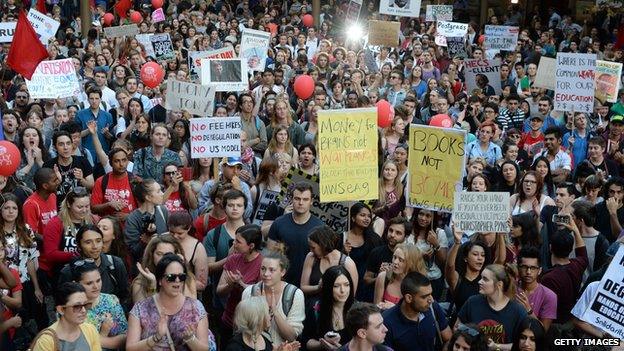
Students have protested against proposed changes to university fees
In May, the government announced a shake-up of the university sector, proposing legislation that would have removed caps on university fees, cut university funding by 20% and increased rates on student loans.
The government argued the changes would liberate Australia's tertiary education sector, making it stronger and more internationally competitive. Some universities welcomed the removal of a cap on fees, saying it would help them address funding shortfalls.
But the bill was deeply unpopular with voters, and sparked protest marches from students. In December it was blocked in the Senate. Labor and the Greens opposed it and the government failed to secure support from minority party and independent senators.
Labor argued the move was "a blatant attempt to take large sums of money away" from universities and pass the costs on to students.
The government has since reintroduced amended legislation into parliament, which will be debated in February.
Medicare

Doctors, the opposition and the public were united in dislike of the government's plan
Under a plan to pass more healthcare costs on to consumers, a charge of A$7 (£3.7; $5.70) to see a GP would have been introduced. This had to be shelved, because it became clear it would not pass the Senate.
Then came a second proposal, whereby the government would cut a subsidy paid to GPs to see patients - leaving doctors to decide whether or not to pass the cost on to patients.
Doctors campaigned against the moves. Prof Heather Yeatman, president of the Public Health Association of Australia, said GPs were "being forced to do the dirty work of the government".
In mid-January, Health Minister Sussan Ley said the changes were being shelved. But she said the government was still intent on introducing tougher "price signals" to the public healthcare system, whose costs were growing at "a rapid and unsustainable rate".
'Knightmare'
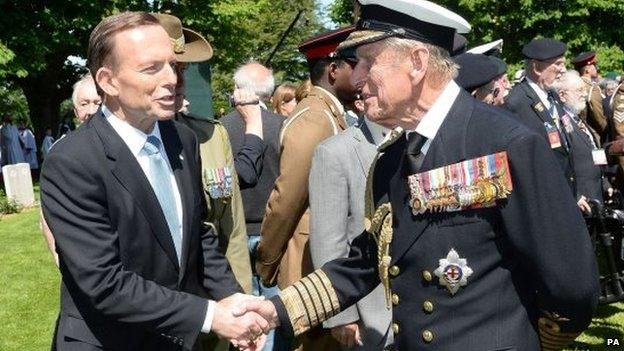
Across Australia, voices asked why the nation's top honour went to Prince Philip
Australia's top honours were announced on 26 January - Australia Day - and there was general bafflement when Prince Philip was named a knight.
Mr Abbott - who re-introduced knighthood and damehood honours last year, nearly 20 years after they had been discontinued - said the Prince had lived a "long life of service and dedication".
But the opposition poured scorn on the appointment, calling it out of step with modern Australia.
Media, across the board, were bewildered, calling it Mr Abbott's "Knightmare". "What was the prime minister thinking?" asked an editorial in The Australian, describing the prince as "a symbol not just of another time but another country".
Even members of the cabinet were taken aback by Mr Abbott's move, which he later described as a "captain's call" on which he had not consulted his colleagues. Mr Abbott has since conceded he "probably overdid it".
Paid parental leave (PPL)
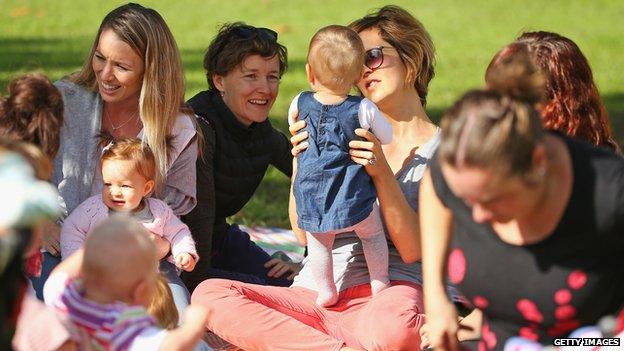
Paid parental leave was a key Abbott policy - but one he has now shelved
The plan, announced in 2010, became Mr Abbott's signature family policy, external. It outdid the 18 weeks on minimum wage established under Labor by offering new mothers up to half a year of leave on full pay, capped at an annual salary of A$150,000. Two of those weeks could be taken by fathers.
The A$5.5bn scheme would have been funded by a levy on high-income companies.
Mr Abbott himself said he has taken "a lot of flak" over the plan. Critics said the costly scheme was unworkable at a time of tightening budgets, while business resented to having to pay for it. Family groups objected to the supporting of high-earners and said ensuring affordable childcare was a bigger priority.
The salary threshold has already been lowered by A$50,000, but Mr Abbott has now announced the scheme is "off the table" entirely, promising instead better-targeted support for families and help with childcare costs.
Queensland polls
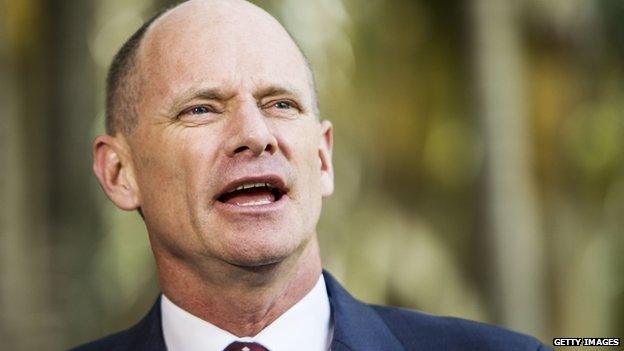
Campbell Newman lost a huge majority - but was he seen as a proxy for Abbott?
Queensland Premier Campbell Newman declared his political career "over" after the Liberal-National coalition suffered a massive defeat to Labor in a state election on 31 January.
The collapse of the state's largest-ever majority after just one term has been blamed on Mr Newman's unpopular policies of privatisation and public sector cuts, but has also been widely seen as an indictment of Mr Abbott.
The prime minister said he regretted that the knighthood row became a "distraction" in the final days of campaigning, but has insisted he will not resign.
Labor leader Bill Shorten suggested to the Liberals that "if they think it's the salesman, not what they're selling" that is causing problems "then they will have learnt nothing".
A similar pattern was seen in Victoria's state elections in November last year, where the coalition was also booted out after just one term. At that time, Mr Shorten said there was "no doubt Victorians used this election to send Tony Abbott a clear message".
- Published2 February 2015
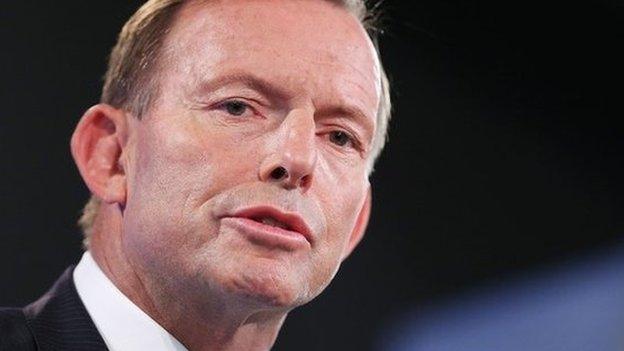
- Published1 February 2015
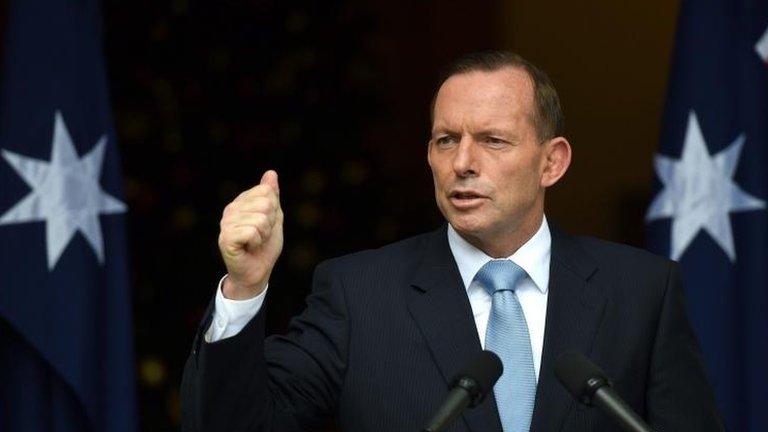
- Published28 January 2015
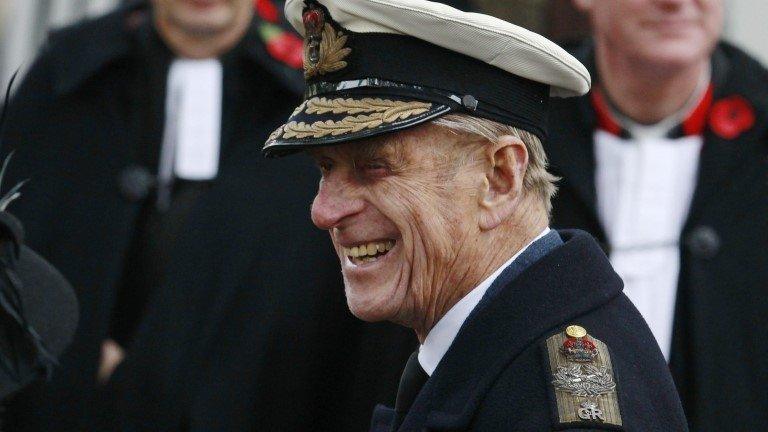
- Published15 January 2015
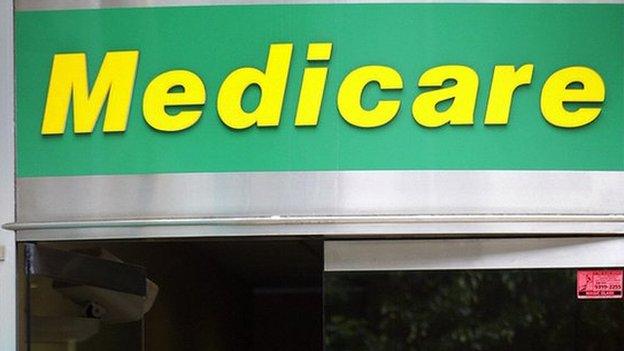
- Published14 September 2015
